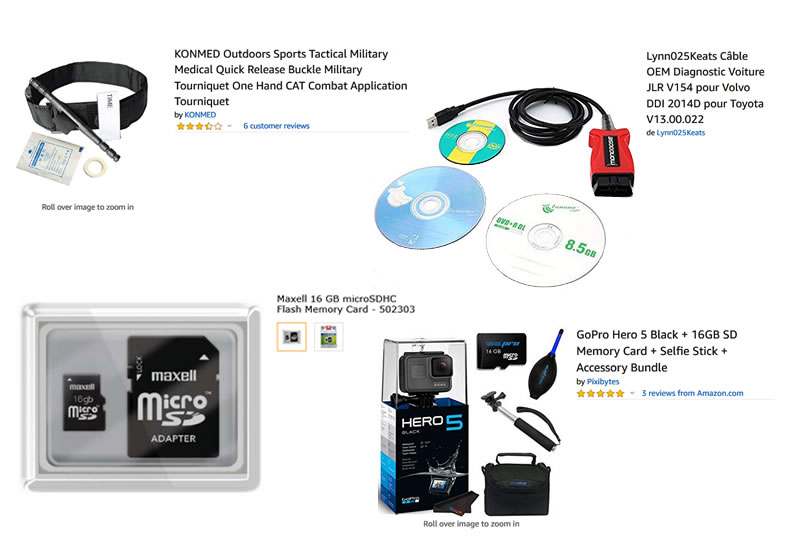Counterfeit Enforcement Lacking For Amazon's Global Websites
Amazon turns a blind eye to reported counterfeits
August 7, 2019, Los Angeles, CA – Worldwide consumers purchasing from Amazon's 13 global websites face a real challenge when shopping Amazon's monopolizing global e-commerce marketplaces -- dodging the fakes, fraud, and scams that flood the e-commerce giant's websites.
40% of Amazon's European marketplace sellers are based in China, and about 70-80% use local Fulfilled by Amazon ("FBA") services to distribute their goods according to Marketplace Pulse, an e-commerce intelligence and data firm. Amazon FBA allows China sellers to remain invisible to Amazon global buyers while flooding Amazon's e-commerce marketplaces with fakes and the appearance the items are coming from Amazon. They are not.
Amazon has exhausted its illusory counterfeit policy, "Products offered for sale on Amazon must be authentic. The sale of counterfeit products is strictly prohibited," yet dodges liability claiming it has complete legal immunity for dishonest seller practices, counterfeit, and fraudulent third-party sales activity. Amazon still takes a transaction fee for each item sold. While the deceptive practices thrive, Amazon continues to tell the media and policy-makers that it has "zero tolerance" for fakes, fraud, and bad actors. That's also not true.
Consumers might still place their confidence in Amazon's guarantee; "We stand behind the products sold on our site with our A-to-z Guarantee." That could be true, but only if Amazon informed consumers (or they knew) they received a counterfeit product. Of course, consumers would then be entitled to a refund. Amazon normally does not notify consumers they received a fake, even after being notified by the brand-owner.
When you make a claim, you better make sure it’s true and that you’re actually doing what you claim you’re doing. When you get caught lies or exaggerations, your credibility is destroyed. That's happened to Amazon who is also facing allegations of data leaks and employee bribes. Recently, Amazon was accused of for fraudulently obtaining patient prescription medication histories. The matter was referred to the FBI.
The Counterfeit Report, an award-winning consumer advocate and counterfeit watchdog, found over 140,800 fake, fraudulent, and replica items on Amazon and removed 61,820 fakes on behalf of infringed brand owners. Some counterfeit products removed from one Amazon website were allowed to remain on some of Amazon’s 13 other global websites. Amazon Global Brand Relations Managers Jason Noggle and Kaleigh Miller were assigned to support The Counterfeit Report, but haven't responded to reported problems for over nine months. Amazon's dysfunctional automated systems are glaringly apparent, generating over 14,000 meaningless or unrelated email responses while complaints are often ignored.
Some products are dangerous, potentially deadly, or don't even exist in the manufacturers' product line yet remain for sale on multiple Amazon websites. For example:

Shown (Product screenshots from various Amazon Europe websites );
Amazon's Corporate Counsel, Annasara Purcell, provided written confirmation of the deceptive practices to The Counterfeit Report; "We remove suspected counterfeit items as soon as we become aware of them, and we remove bad actors from selling on Amazon," but only some, adds Ms. Purcell; "trademark rights are jurisdiction specific and the fact that a brand has rights in one country is not indicative of comparable rights worldwide." The comments were echoed and endorsed by Amazon CEO Jeff Bezos. It's hard to reconcile Amazon's policy prohibiting counterfeits with Amazon's actions. What is clear is that Amazon profits from deception while consumers suffer the consequences.
To memorialize the practice, The Counterfeit Report purchased dangerous counterfeits from three different Amazon USA sellers registered in Pennsylvania or Texas and selling on Amazon's U.K. website. The fakes were delivered in the U.S. -- Amazon says that's OK. The Counterfeit Report also made counterfeit purchases from other worldwide Amazon sellers registered in China and delivering in the U.S. -- Amazon says that's also OK. The counterfeits remain.
The counterfeit items often remain for months despite hundreds of repeat infringement notices. If removed, the sellers often relist, use multiple usernames, or open new accounts. Amazon's seller evaluations (feedback) and product reviews are virtually worthless; negative reviews are removed by Amazon, while sellers hire businesses to create dummy accounts, purchase products, and write fictitious reviews and complaints. The Counterfeit Report's product reviews warning consumers of counterfeit items have repeatedly been removed or blocked by Amazon.
Amazon can't (or won't) control counterfeits and criminal behavior on its websites, yet Amazon strives to control sensitive consumer drug purchases and health data, retail food products, and store government data in the Amazon cloud.
Amazon is disrupting the retail world and leaving consumers on their own to sort the legitimate, honest sellers from all the bad actors -- the risk is glaring.
Amazon has some explaining to do.
 |